#They want to be Ticketmaster and Major Record Label all in one for big-name musicians
Explore tagged Tumblr posts
Text
This is at least the third time this has happened with Patreon as it also happened in 2022 and 2021, and I believe also happened in 2020 and 2018. Every time, it's because Patreon changes the financial institution overseas it processes payments through, and every time a bunch of banks and credit card companies flag the transactions as potential fraud because of it.
You'd think after doing this multiple times they would know to warn banks ahead of time or at the very least warn Patreon creators and users...
Patreon done goofed.
If you haven't been made aware, Patreon shat the bed at the start of this billing cycle:
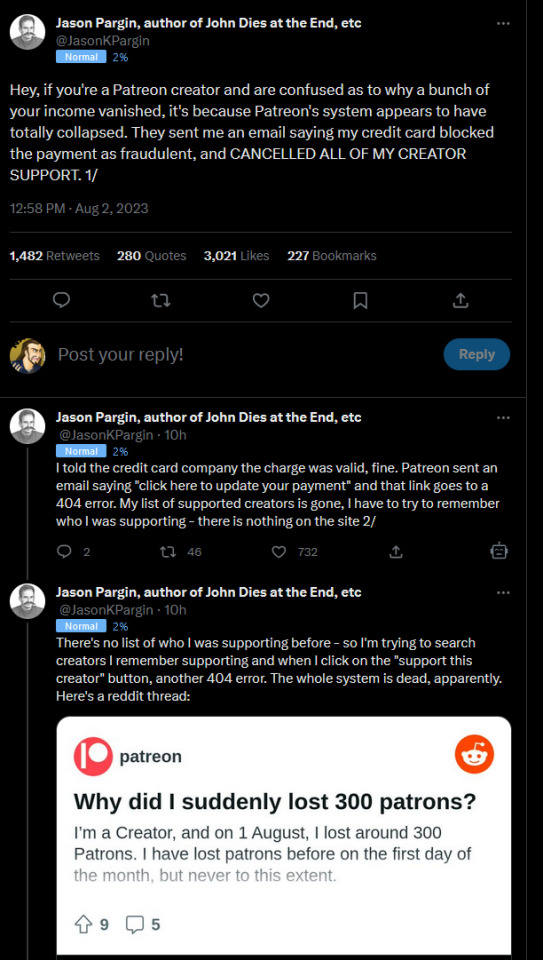
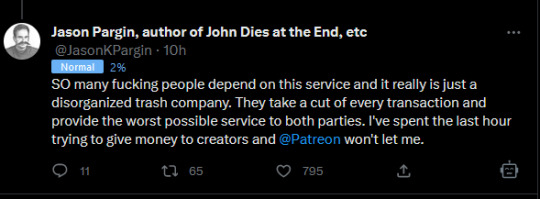
I had quite a few Patrons knocked off the roll this time around. If you got declined or a fraud warning or something, please be patient and try to stay on top of it.
Considering Grady's health issues, this comes at a really bad time. Pitching in would be appreciated.
#patreon#Patreon has made it pretty clear they don't give a shit about creators#They don't want to be a micropayment support for independent creators#They want to be Ticketmaster and Major Record Label all in one for big-name musicians
18K notes
·
View notes
Text
The Azoff Family: A Case Study on one of the Music Industry’s Most Connected Families
(ft. a breakdown of the Grammy voting process and problems)
This is very long so I will try and split it up into categories for everyone (sorry I got carried away- I spent like 2 hours writing this) but enjoy!
*Disclaimer: I want to preface while the majority of this is based in research, some parts may be speculation. I don’t know the family personally so I can’t tell you what goes on behind closed doors but I can tell you how parts of the entertainment/music industry work. I’ve had 5 internships in the industry (one in marketing at one of the big record labels) and the rest of my work is publicity (what I enjoy) and events and a former advisor used to run in the same circles as Irving Azoff (and he spilled some tea last year) I’m not out here to diminish the hard work of any artists or their teams, I’m simply here to showcase parts of the industry that aren’t always shown.*
Please also see: Story Time: How Fan Pages Directly Impact Columbia Records Decisions and Harry Styles Image
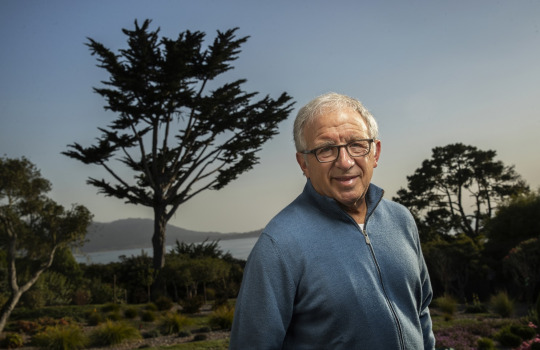
IRVING AZOFF: NEVER STOP THE GRIND
Let’s begin with the great business man himself Mr. Irving Azoff Irving Azoff is the literal posture child for connections and power in the music industry (he was also inducted into the 2020 rock and roll hall of fame class which is like a huge fucking deal for a manager to be inducted so you know he's the real deal)
In conclusion, I love Irving Azoff and his drive.
Irving Azoff: Early Years Run Down:
He came up middle class (dad was a pharmacist, mom a bookkeeper) in Danville, Illinois
He dropped out of college to run a small Midwestern concert-booking empire and managed local acts in the era
Opportunity came knocking and he got the chance to manage the Eagles and the rest is history
He's one of the best negotiators and has negotiated business on behalf of stars like Stevie Nicks, the Eagles, and Jimmy Buffet
Azoff has been an incredible manager and his drive to always advocate for his clients while basically not giving two sh*ts about what people think of him has gotten him the incredible reputation he has today.
All of Irving Azoff’s Major Job Positions:
Former President MCA (major label)
Former CEO of Ticketmaster and executive chairman of Live Nation Entertainment, the behemoth formed from Ticketmaster’s merger with Live Nation.
In 2013 he and Cablevision Systems Corp. CEO and New York Knicks owner James Dolan formed a partnership, Azoff MSG Entertainment (Currently still CEO)
----> Azoff also ran the Forum in Inglewood under Azoff MSG Entertainment after MSG purchased it in 2012 (it was sold in 2020 to the owner of the Clippers) — why do you think Harry played the forum for the Fine Line show? Azoff connection
Azoff MSG Entertainment encompasses all of the other companies including Full Stop Management, Global Music Rights (performance-rights org), and the Oak View Group (arena developing company)
He also is the co-founder and manager of the lobbying group Music Artists Coalition, a group that helps lobby for artists-rights issues such as royalty rates, copyright issue and healthcare insurance (see he's not all bad)
Essentially what I'm getting at is this man knows anybody who's anybody. He's the man you want on your team to help promote your music, plan your tour, and get you on that Grammy nom list.
---------------------------------------------------------------------------

JEFFREY AZOFF: THE CHILD OF NEPOTISM
So for those of you that don't know, Jeffery Azoff is Harry's current manager and the son of Irving Azoff (the third of four kids). He's currently a partner at Full Stop Management, the company owned by Irving and the one artists such as Harry, Haim, the Eagles, Kings of Leon, and Meghan Trainer are signed to.
Jeffrey graduated from the University of Colorado's Leeds School of Business and started working fresh out of college at his father's old Management company (Frontline Management) working under Maroon 5's manager Jordan Feldstein (the only way you get that kind of internship/job as a 21 year old fresh out of college is if your family or family friends gives it to you). He worked here for 5 years.
Direct Quote from Irving Azoff to Jeffrey (really tells you a lot): "Listen carefully, because I’m going to say this one time. You have a phone and you have my last name. If you can’t figure it out, you’re not my son."
After working for his father, Jeffrey moved on to the talent agency CAA (Creative Artist Agency) where he worked for roughly 3 and half years before joining his dad in forming Full Stop Management in 2016.
While he was at CAA, Irving moved over clients like Christina Aguilera and the Eagles to the talent agency to help with tour booking instead of doing it internally through LiveNation (he was CEO).
Even though I'm sure Jeff has had to work somewhat hard to get to where he is (or at least to mess up his dad's work as he doesn't seem like the type to take laziness well), the door into the industry and every job was basically handed to him on a silver platter.
Not to mention if you watch episodes of keeping up with the kardashians (like myself) you can actually see Jeff hanging out with kendall and the rest of the fam at their Palm Springs house (you know you're a nepotism kid if you have an in with the Kardashian crew). Invite me next time Jeffrey!!!
Think of the Azoff's as the mafia family of the music industry, you don't mess with the mafia
-----------------------------------------------------------------------------
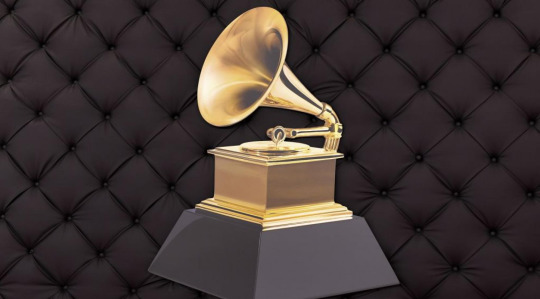
THE GRAMMY AWARDS: STUDENT COUNCIL ELECTIONS ON STEROIDS
Ok so here's where we’re going to get into a bit more of the speculation/grey area. I don't need to tell you that award shows are corrupt (See the Golden Globes Emily in Paris scandal) and the Grammys are not an exception. Think of the Grammys as one big student council/government elections where despite the fact the teachers tell you six times to vote for the best candidate, you're still going to vote for your friends even if they aren't the best.
A simplified break-down of Grammy voting:
1) Recording Academy voting members (artists, producers, musicians- anyone involved first hand with the creation of music; All voting members must have been producers, performers or engineers on six or more tracks of a commercially released album (or 12 or more digital tracks) and record labels will submit nominations in various categories to the grammys (songs need to be released commercially between October 1 of the previous year and September 30th of this year). You can also become a voting member by either winning a grammy or being endorsed by a current voting member (hint hint)
2) Once received, the recording academy with have the academy of trustees and its reviewers organize them and approve any changes to the 30 categories/fields (aka they can add new categories or remove old ones; so no best ukulele album of the year -- this is where things get funky)
There's speculation that during this stage when these special groups of 8-10 people are organizing genres, there's an "unwritten rule" that you need to be careful what album you green light (especially for famous artists) if you don't want them to win) (Rob Kenner said this- he used to be on one of these committees). Famous people tend to get more votes from clueless or lay Academy members that don't know the specialized categories or don't care enough to listen to songs that aren't radio trending.
3) After the nominations occur, Voting members begin their first voting. Members can vote for the four general categories of record of the year, album of the year, song of the year and best new artist and a maximum of 15 categories, all within their areas of expertise. Now the interesting thing is that while these are the guidelines there is literally nothing stopping them from voting in whatever categories they want (i.g. a rapper voting in the opera category despite not listening to opera). Theses ballots are all tallied and the top 20 entries are determined in each category (funky moment #2)
In 12 of the 84 categories those top 20 go to the ballot and it's done; for the rest it’s not like that. 59 categories including the big four go to a "nomination review committees" (identities are protected so they can't get lobbied... sure) who take a look at the top 20 and narrow it down to 7 or 8. (these are the special committees the Weekend talked about when he was snubbed). They're supposed to choose the nominees "based solely on the artistic and technical merits of the eligible recordings" which lets be real if that was the case Watermelon Sugar (along with most of the others in the category) I don't think would have been nomimated as they are very generic pop (none of them are special... sorry to the WM lovers out there).
This committee is basically held to THE HONOR CODE SYSTEM... I mean tell me when the last time the honor code system worked in literally any scenario (literally wtf). Don't take my word for it though the former CEO of the Academy Deborah Dugan (a queen) filed a complaint against the Recording Academy basically claiming that the nomination review process was rigged (she was fired after 5 months on the job).
Quote from Deborah Dugan "Members of the board [of trustees] and the secret committees chose artists with whom they have personal or business relationships... It is not unusual for artists who have relationships with Board members and who ranked at the bottom of the initial 20-artist list to end up receiving nominations."
These review committees can also exploit there power by adding up to two nominees that don't appear on the top 20 list to the final voting ballot (except in the 4 big categories - which watermelon sugar that one wasn't nominated for)
They also have craft committees for like non performance stuff (like album notes, engineering and arranging) that don't even get voted on by the academy voting members
4) After all of that fucked up mess, the grammy's decided is ok, the ballots go back to the voting members for the final vote. Deloitte (an accounting firm) then counts all of them, seals them in envelopes, and delivers them to the Grammy award show.
** The Grammy's just announced this year they're removing the "secret committees" so let's see how things shift in the next couple of years**
So obviously I'm not saying this to discredit Harry's nomination or his win as Fine Line was in the US top 20 albums for the majority of 2020, however, we must acknowledge privilege. Harry has a big name to him and a huge following, and while all of that shouldn't be taken into account, it does. He also has the Azoffs, a very well connected family with friends in lots of places that would be able to put in a good word here and there to get support behind Harry. Harry won best pop solo performance for Watermelon Sugar in a category with Doja Cat, Justin Bieber, Billie Eilish, Taylor Swift, and Dua Lipa. Look at the names there, the songs (ya'll can try and remember them cause I'm too lazy to write it out) and tell me that those top names with all of the music produced didn't get there through some connections.
Do with all this information what you will and if you are interested in learning more about the entertainment industry on your own Endeavor (owners of WME, a big talent agency like CAA) is hosting a free online program called the Excellence Program to help guide the future generation of industry executives. The program is a-synchronous and starts on July 12th. Highly recommend giving it a go if you're interested!!!
Alright ya'll that's it. Feel free to message me with your thoughts!
Extra Sources if you'd like to read:
https://www.vice.com/en/article/pkdndn/how-grammys-voting-actually-works-and-where-the-alleged-corruption-lies
https://www.grammy.com/grammys/awards/voting-process
https://www.latimes.com/entertainment-arts/music/story/2020-11-05/irving-azoff-eagles-manager
https://celebrityaccess.com/caarchive/jeffrey-azoff-exits-caa-to-launch-new-management-company/
https://www.rollingstone.com/pro/features/grammy-awards-secret-committees-945532/
https://www.rollingstone.com/music/music-news/grammy-awards-eliminate-secret-committees-voting-changes-1163887/
#harry styles#irving azoff#jeffrey azoff#Grammys#harry styles imagines#harry styles blurb#music industry#endeavor#wme#WME entertainment#Azoff#Harry#harry styles imagine#harry styles fluff#harry styles x reader#harry styles x y/n#harry styles x you#harry styles masterlist#harry styles one shot#harry styles angst
172 notes
·
View notes
Text
The music monopolists
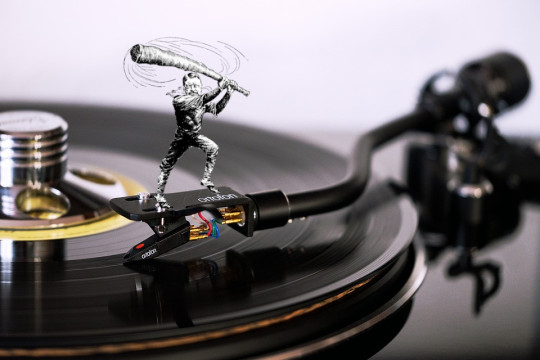
Writing in Wired, Institute for Local Self Reliance researcher and anti-monopolist Ron Knox gives a thorough, important account of how music industry monoplization resulted declining revenue for artists, even as the industry itself has reaped greater profits.
https://www.wired.com/story/opinion-big-music-needs-to-be-broken-up-to-save-the-industry/
Importantly, Knox describes how concentration has come to every link in music’s supply chain, from radio to recording, streaming to live performance. The monopolists who dominate these sectors fight fiercely between each other, but no matter who wins, artists lose.
Let’s go segment by segment. Two thirds of all North American music comes from three labels. The labels grew through anticompetitive mergers: giant companies, awash in investor cash, bought out mid-sized, successful labels, turning them into subdivisions of the Big Three.
The more concentrated the labels got, the worse they were for everyone. They spent the nineties and naughties price-gouging record companies, pocketing hundreds of millions from an illegal price-fixing conspiracy. The fines they paid were smaller than the profits they reaped.
But at least they distributed music. Today, the struggling physical record store industry — a network of passionate music sellers who serve the most intense music fans — find themselves getting “record shipments” that turn out to be boxes of random stuff like cough syrup (!).
That happened when the Big Three all piled their distribution into a single company, the monopolist Direct Shot Distributing. As Direct Shot started to fail, its operations descended into chaos, and record stores started to receive boxes of random consumer packaged goods.
It was bad news for the non-monopolized, music-first record stores, but it barely registered for the Big Three labels — today, they buy an average of two new acts every day.
The labels don’t make money from selling records, of course. They get their money from streaming.
Streaming is also massively concentrated, gathered into the hands of just a few companies: Spotify, Apple, Youtube, Amazon — with the notable exception of Spotify, the industry is dominated by companies that also monopolize other sectors.
Monopolies are good to these companies. Spotify’s market-cap doubled during the pandemic — the market values its 150m subs (twice as many as subscribe with Apple) at $50b. The major labels get $1m/hour from streaming. 99% of their artists see $25/year in streaming royalties.
Spotify may be the biggest streaming service, but it’s not the lowest-paying. Youtube — a Google division, whose unsuccessful attempt to launch an in-house video service convinced it that it had to buy someone else’s success — drives the worst bargain.
Spotify uses its industry dominance to extract heavy fees from the labels — creaming 30% of the total revenue generated by a typical track. Big Three monopolists with fat margins can absorb this. Indies? Not so much.
Spotify’s market cap growth is in part due to the new ways it’s come up with to shake down the labels — a variety of tactics that all boil down to one thing: payola. Spotify will sell labels pop-up ads, placement in “radio” algorithms, and access to “Discovery mode.”
Like all forms of payola, Spotify’s rate-card is a way for monopolists to edge out indies, buying their way into your ear-holes. I’m sure that the Big Three would rather keep the bribes they pay to Spotiify, but the consolation prize is pretty sweet.
If the Big Three are the only ones who can afford to buy access to Spotify’s audience, then creators are driven to sign with them, and have less bargaining leverage when they negotiate their deals.
Spotify, meanwhile, can consolidate its gains by driving up those fees, pitting labels against each other in a bidding war for access to listeners. This effectively drives down the royalty rate Spotify pays, because every new track will have to buy in to get any reach.
Spotify talks a good game about how it uses big data and machine learning to pick the songs you hear, but increasingly, the algorithm is getting far less compute-intensive, a simple sort-by-highest-bidder system you could operate from a laptop running Windows 3.1 and Excel.
In theory, streaming losses can be made up with touring. Acts who attain digital popularity can charge access at the door to clubs and other venues. The only problem is that live performance is also a monopoly business.
The 800lb gorilla there is Livenation, a division of the ticket monopolist and notorious arm-breakers Ticketmaster — spun out of Clear Channel, the monopolist that we now know as Iheartradio.
Livenation parlayed its access to the capital markets to buy out $1b worth of venues and promoters, before being acquired by Clear Channel for $4.4b in 2005. Today, it’s a division of Liberty Media, consolidated with Ticketmaster, Pandora, and Siriusxm.
What goes around, comes around: Liberty’s private equity owners are in the process of buying up Iheartradio, re-merging all of Clear Channel’s spinouts into one giga-monopolist.
The conglomerate already coerces artists to book exclusively in its clubs and using its ticketing, starving independent venues. Add 850 terrestrial radio stations to the mix and it will choke off all the oxygen that independent venues, promoters and ticketers rely on.
Liberty didn’t buy all these companies because it’s passionate about music and wanted to ensure artists got a fair shake. By rolling up the entire live music/radio supply-chain, it bought the power to extract vast sums from musicians, and to keep rivals out of the market.
Well, not all competitors. Lollapalooza co-founder Marc Geiger raised tens of millions for “Savelive,” a new would-be monopolist that offered to “rescue” live music venues in exchange for a 51% stake in them.
Savelive illustrates an important point about the nature of monopolies: they beget more monopolies. Consolidation in the labels meant that only the largest streaming companies could negotiate a sustainable rate.
But consolidation in radio drives consolidation in labels — and many of the indie radio stations that survived the first wave of consolidation were picked up cheap by Iheartradio once monopolistic streamers ate their lunch.
This is a pattern across the whole entertainment industry: bookstore mergers and big box retailers drove consolidation in publishing; that was accelerated by consolidation in online ebook and physical book retail.
It’s not limited to the entertainment sector either. As David Dayen describes in his essential book MONOPOLIZED, hospitals didn’t start consolidating until the pharma industry underwent a wave of brutal mergers and started gouging for drugs.
https://pluralistic.net/2021/01/29/fractal-bullshit/#dayenu
Hospital consolidation led to gouging insurers, leading to a wave of insurance consolidation. Today, nearly every part of the health industry is monopolized, from pharmacy benefit managers to medical labs.
The only parts of the supply chain that doesn’t monopolize — that can’t monopolize — are the ends of the chain: the people who work in the system, and the people who use it.
Monopoly punishes doctors and nurses and other health workers — and it punishes patients.
It punishes writers and publishing workers, and it punishes readers.
It punishes musicians and independent venue owners, and it punishes listeners.
When every part of the supply chain gets so monopolized that it can’t easily be squeezed by any other part of the supply chain, these giants turn on us — the workers and users of the system. We, the atomized and fragmented, cannot resist the squeeze.
But as Knox writes, the tide is turning. After 40 years of waving through anticompetitive mergers in the name of “efficiency,” the DoJ and FTC are under new management, with two-fisted trustbusters like Lina M Khan at the helm.
https://www.eff.org/deeplinks/2021/08/party-its-1979-og-antitrust-back-baby
This new cohort of monopoly fighters reject the “consumer welfare” theory of antitrust (the idea that monopolies drive prices down and are therefore good for society), going to war against the hegemonic orthodoxy that began with Ronald Reagan.
https://doctorow.medium.com/epic-v-apple-d3e59893b4f3
The new antitrust is surging, with bills in the House and Senate, executive orders from the White House, regulatory proceedings at the DoJ and FTC, and an interagency-cabinet coordination committee that ties it all together.
This new antitrust promises workers and users of monopolized industries a better alternative than rooting for one giant to beat another in hopes that they will drop a few crumbs for the rest of us to enjoy.
Creative workers don’t have to choose between Big Tech and Big Content based on their assessment of which monopolist will abuse them the least. Instead, we can root for antimonopoly, for giant-slaying, and the right to self-determination.
The most important immediate step towards that future is blocking new anticompetitive mergers, like Sony’s bid for AWAL, or Liberty Media’s use of a $500m SPAC to go on a vertical monopoly shopping spree.
The agencies have the power to stop these. They should. When you find yourself in a hole, stop digging.
But ending anticompetitive mergers won’t get us out of that hole: most industries (from beer to cheerleader uniforms to wresting to eyeglasses) are already monopolized.
The new trustbusters — and the ILSR — want to use antitrust law to break up these conglomerates. I think that’s right: vertical monopolies will always engage in self-dealing to the detriment of independents, workers and customers. Break. Them. Up.
But breaking up is hard to do. When the DoJ tried to break up IBM, the company’s lawyers outspent the entire DoJ antitrust division, every single year, for twelve consecutive years, and in the end, it escaped breakup.
That doesn’t mean we shouldn’t try. IBM escaped justice because Reagan was elected and neutered antitrust. And even though it remained intact, it was never the same — for one thing, it decided that it was too risky to make its own PC OS.
IBM knew that antitrust enforcers were very suspicious of tying software to hardware — so it tapped a couple of hacker kids, Bill Gates and Paul Allen, to sell it DOS, from their new company “Micro-Soft.”
Unfortunately for all of us, antitrust enforcement only declined after that, so IBM was able to return to its monopolistic ways, and Microsoft escaped from antitrust scrutiny after a mere seven years in regulatory hell.
Antitrust enforcement can sap monopolists of the will to power, as they become increasingly concerned that their actions will attract aggressive legal reprisals.
Think of how Apple “lost” the Epic lawsuit but still “voluntarily” rescinded its heretofore hard rule against apps providing links to web-pages where you can use third-party payment processors to make purchases.
As monopolists lose their nerve, space opens up for all kinds of pro-worker, pro-user interventions, far beyond those afforded by traditional antitrust.
Next year, Beacon Press will publish THE SHAKEDOWN, a book I co-wrote with Rebecca Giblin about the monopolistic corruption of creative labor markets and how creative workers, regulators and fans can resist it.
The Shakedown catalogs the ways that monopolization of investment, distribution and sale of creative works allows entertainment companies, Big Tech, and major retailers to shift an ever-larger share of the creative industry’s revenues from workers to themselves.
More importantly, we identify tools beyond breakups that we can use to de-monopolize the industry — things we can do right now, without having to wait for the conclusion of an antitrust suit that might run for decades.
Take reversion rights: many copyright systems allow creators to take back their rights after a set period (35 years in the US). This lets artists who signed bad deals — before they were proven successes — to resell their catalog or extract reparations by threatening to.
But reversion is really hard to do, and 35 years is way too long. Only an handful of creators — even those with valuable catalogs that could be renewed through reversion — ever manage it.
https://pluralistic.net/2021/07/06/backsies/#take-backs
Congress (and other legislatures around the world, including Canada, where this is likely to come up in the new Parliament) could fix reversion: make it easier to do, and make it available after a shorter period — say, 14 years.
And what about those bad contracts? The “freedom to contract” has always been subject to limits, where some clauses are deemed unenforceable “as against public policy” or because they are “unconscionable.”
With the entertainment sector consolidated into just a couple of states, state legislatures could act to void the most abusive clauses — for example, clauses that allow labels to claw back royalties indefinitely to recoup (often inflated or fictitious) “expenses.”
Our book explores dozens of these kinds of ideas, from co-operatives to trade unions; better accounting practices and direct arts subsidies; radical interoperability and collective licensing; minimum wages for creative labor and collective bargaining.
None of these are replacement for reducing the size and power of conglomerates throughout the supply chain, but all of them are interventions we can make as the power and nerve of conglomerates declines, changes that will hasten that decline and open more space for breakups.
And all of them are applicable, to a greater or lesser extent, to helping workers and users of all the other consolidated industries, from health care to cheerleading.
For example, expanding California’s ban on noncompete clauses would help fast-food workers nationwide — because today, fast food employers are the most aggressive abusers of noncompetes.
That means that a fried chicken cashier earning the tipped minimum wage can’t quit to work at a burger joint across the street for a $0.25/hour raise. Creative workers aren’t the only ones suffering from monopolization — we’re not even the worst off.
But by definition, creative workers have a platform. We reach people. We have the potential to help form the kind of unstoppable coalition that we’ll need to reverse the generations of oligarchic, post-Reagan consolidation.
You may have heard about how Danish McDonald’s workers earn $22/hour and get six weeks’ paid vacation and sick leave. That didn’t come about because McDonald’s was required by law to pay it.
It was worker solidarity that did it. As Matt Bruenig writes, McDonald’s initially refused to sign the voluntary “hotel and restaurant” collective agreement. So its workers went on strike.
https://mattbruenig.com/2021/09/20/when-mcdonalds-came-to-denmark/
Now, if McD’s workers had struck alone, they’d probably have lost. But Danish law allows for sympathy strikes — that is, it allows workers in other parts of the supply chain to take industrial action to support their sisters and brothers who are striking.
When the McD’s workers walked out in 1989, sixteen other sectoral unions joined them. They didn’t just help picket at leaflet in front of McD’s restaurants!
Dockworkers wouldn’t unload McD’s shipments. Printers wouldn’t print their cups and placemats.
Builders downed tools on McDonald’s construction projects. Typesetters wouldn’t set the McD’s ads in the daily papers. Truckers wouldn’t deliver to McD’s restaurants. Food industry workers wouldn’t produce the drink syrups, fries and other inputs to the McDonald’s kitchens.
McD’s caved.
Now, as Bruenig points out, these kinds of sympathy strikes are illegal in the US, but it’s a mistake to think that workers don’t have power because sympathy strikes are illegal — rather, sympathy strikes are illegal because workers don’t have power.
Workers across all sectors face the same kinds of monopolistic exploitation. Workers across all sectors have a common enemy (literally, thanks to “common ownership” where companies like Vanguard and Berkshire Hathaway hold significant stakes in almost every major company).
With a shared cause, shared tactics, solidarity and a renewed sense that we can do more than root for the giant we think will mistreat us the least, creative workers and their sisters and brothers in every sector can reverse generations of losses.
That’s why the new antitrust matters — because it is an assault on the consolidation that gives all industries the power to shift money and other forms of value from workers and users to a small elite of investors.
48 notes
·
View notes